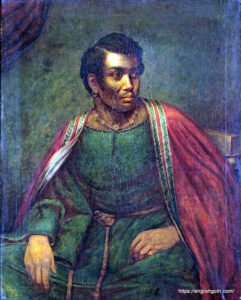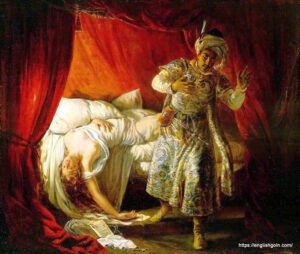Today we will discuss about Othello by William Shakespeare. Othello is a tragedy written by William Shakespeare, believed to have been written in 1603. The play is set in Venice and tells the story of the Moorish general, Othello, who falls in love with and marries Desdemona, the daughter of a Venetian senator. Despite their love, jealousy and deceit consume the characters, leading to a tragic end.

Othello by William Shakespeare
The play explores themes of jealousy, betrayal, love, race, and the destructive power of manipulation. Othello’s trusted advisor, Iago, manipulates Othello into believing that his wife is unfaithful, and this leads to a series of tragic events. Alongside Othello and Desdemona, the play also features other notable characters such as Cassio, a lieutenant to Othello, and Emilia, the wife of Iago.
Othello is considered to be one of Shakespeare’s greatest tragedies and is revered for its complex characters and exploration of timeless themes. The play has been adapted into numerous films, stage productions, and even operas, and it continues to be studied and performed today.

Major characters in William Shakespeare’s play Othello, along with their notable characteristics:
Character Details of Othello:
Othello is the tragic protagonist of William Shakespeare’s play “Othello”. He is a highly respected and accomplished general in the Venetian army, but also a vulnerable and tragic figure whose downfall is ultimately brought about by his own insecurities, jealousy, and lack of self-control.
A noble Moorish general in the Venetian army. He is a complex character who is confident in his military abilities but vulnerable to the manipulation of those around him. Othello is also deeply in love with his wife, Desdemona.
Othello is portrayed as a complex character who struggles with his identity and sense of belonging throughout the play. As a black man in a predominantly white society, he faces constant prejudice and discrimination. He has risen to a position of power through his military achievements, but still feels like an outsider and is sensitive to any perceived slights or insults.
Despite his initial confidence and dignity, Othello’s tragic flaw is his insecurity, which is exploited by his scheming and manipulative subordinate Iago. Iago convinces Othello that his wife, Desdemona, is having an affair with his trusted lieutenant, Cassio. Othello’s jealousy and anger spiral out of control, and he ultimately murders Desdemona before realizing the truth.
Othello is a tragic hero because he is a noble and virtuous character, but his downfall is brought about by his own flaws and weaknesses. He is a victim of his own tragic flaw and the manipulations of Iago, but he also bears responsibility for his actions and their tragic consequences.
Overall, Othello is a complex and tragic figure who embodies both the strengths and weaknesses of human nature. His story is a cautionary tale about the destructive power of jealousy, insecurity, and unchecked emotion.

Character Details of Desdemona:
Othello’s wife and daughter of a Venetian senator. Desdemona is a virtuous and loyal woman who is deeply in love with her husband. She is also innocent and trusting, which makes her vulnerable to Iago’s manipulations.
Desdemona is a central character in William Shakespeare’s play “Othello”. She is the daughter of a Venetian senator named Brabantio and the wife of the tragic hero Othello, a Moorish general in the Venetian army.
Desdemona is a virtuous, loyal, and innocent woman who is deeply in love with Othello. She is kind, compassionate, and empathetic, and she tries to help those in need whenever she can. She is also intelligent and articulate, and she is not afraid to speak her mind.
Despite her many admirable qualities, Desdemona is ultimately a tragic figure in the play. Her love for Othello ultimately leads to her downfall, as her husband’s jealousy and suspicion that she has been unfaithful with his lieutenant, Cassio, lead him to murder her. Desdemona’s innocence and loyalty are ultimately no match for Othello’s overwhelming jealousy and rage.
Desdemona’s character is complex and multifaceted, and her portrayal in the play raises questions about gender, power, and the role of women in society. While she is ultimately a victim of Othello’s jealousy and violence, she also displays agency and courage in standing up for herself and defending her reputation.
In conclusion, Desdemona is a tragic character in “Othello” who embodies virtues such as loyalty, compassion, and intelligence. Her character raises important questions about gender, power, and the role of women in society, and her ultimate fate underscores the destructive power of jealousy and suspicion.

Character Details of Iago:
Othello’s ensign and the main antagonist of the play. Iago is one of the most complex and intriguing characters in William Shakespeare’s play “Othello.” He is the primary antagonist of the play and is often considered one of the greatest villains in all of literature. Iago is a skilled manipulator and a master of deception who uses his intelligence, cunning, and charisma to manipulate the other characters in the play.
At the beginning of the play, Iago is passed over for promotion by Othello, the play’s protagonist, who instead chooses Cassio, a young and inexperienced soldier. This rejection is the catalyst for Iago’s plan to destroy Othello’s life and reputation. Iago is driven by a deep sense of jealousy and resentment towards Othello and Cassio, whom he sees as inferior to himself.
Iago’s motivations for his actions are complex and multifaceted. On the surface, he appears to be motivated by revenge and a desire to harm Othello. However, his true motivation is more complicated. Iago is a deeply unhappy person who is filled with bitterness and resentment towards the world. He is jealous of others’ success and hates those who he perceives as being more successful than himself.
Iago’s manipulation of Othello is masterful. He preys on Othello’s insecurities and fears, convincing him that his wife, Desdemona, is having an affair with Cassio. Iago does this by planting seeds of doubt in Othello’s mind and by manipulating the other characters to create a situation that appears to confirm Othello’s suspicions.
Throughout the play, Iago is a consummate actor who is able to manipulate his emotions and those of others. He is a skilled liar and is able to deceive even the most astute characters in the play. He is also a master of language and is able to use words to great effect, using his wit and charm to win over others and to create a sense of trust and loyalty.
In conclusion, Iago is a complex and fascinating character who is both villainous and sympathetic. He is a master manipulator who is driven by jealousy, resentment, and a desire for revenge. His cunning and intelligence make him a formidable opponent, and his ability to deceive and manipulate others makes him one of the most memorable characters in all of literature.

Character Details of Cassio:
Othello’s loyal and competent lieutenant. Cassio is an honorable man who is well-respected by his fellow soldiers. He is also a close friend of Desdemona.
Cassio is a key character in William Shakespeare’s tragedy “Othello”. He is a young, handsome and charming lieutenant to the protagonist, Othello. Throughout the play, Cassio plays a pivotal role in the plot and the ultimate demise of several characters.
Cassio is first introduced in Act I as an honorable and loyal officer to Othello. He is depicted as a man of integrity, chivalry and a skilled soldier. Cassio is also an educated man with a good reputation, which contrasts with Othello’s own perceived lack of education and racial background.
However, despite his virtues, Cassio also has his flaws. One of his major weaknesses is his tendency to drink excessively, which leads to his downfall. After being manipulated by the villainous Iago into drinking too much, Cassio becomes embroiled in a brawl with Roderigo, which results in his demotion from his position as lieutenant.
Cassio’s downfall serves as a contrast to the rise of Iago, who manipulates events to his advantage. Cassio is ultimately redeemed when he seeks out Othello’s forgiveness and helps expose Iago’s treachery. In this way, Cassio represents the theme of redemption and the possibility of making amends for past mistakes.
Overall, Cassio is a complex character who embodies both virtues and flaws. His downfall and subsequent redemption serve to highlight the themes of manipulation and redemption in the play.

Character Details of Roderigo:
A wealthy Venetian who is in love with Desdemona. Roderigo is easily manipulated by Iago, who uses him to further his own schemes.
He is a Venetian gentleman who is in love with Desdemona and hopes to win her over despite the fact that she has already married Othello, a Moorish general.
Roderigo is a wealthy man who is easily swayed by Iago’s manipulation and is ultimately used as a pawn in Iago’s schemes. Iago convinces Roderigo to finance his plan to bring down Othello and Cassio, promising that Roderigo will have a chance with Desdemona if they succeed. Roderigo is blinded by his love for Desdemona and his desire to win her over, and he is willing to do whatever it takes to achieve his goal.
Throughout the play, Roderigo is portrayed as a weak and gullible character who is easily taken advantage of. He is manipulated by Iago at every turn, and his attempts to win Desdemona’s love only serve to make him look foolish and desperate. Roderigo is also a coward, as he is unwilling to stand up to Iago even when he realizes that he has been deceived.
Despite his flaws, Roderigo is not entirely unsympathetic. His love for Desdemona is genuine, and he is genuinely hurt when he realizes that she will never return his affections. He is also a victim of Iago’s machinations, and it is clear that he would not have been involved in the plot against Othello and Cassio if not for Iago’s manipulation.
Overall, Roderigo is a complex and tragic character who serves as a cautionary tale about the dangers of obsession and the ease with which people can be manipulated.

Character Details of Emilia:
Iago’s wife and Desdemona’s attendant. Emilia is a pragmatic woman who is loyal to her mistress. She also speaks her mind and is not afraid to challenge her husband when she believes he is in the wrong. Emilia is a complex and dynamic character in William Shakespeare’s play “Othello”.
At the beginning of the play, Emilia appears to be a typical Renaissance woman of her time, obedient to her husband and accepting of her subordinate position. However, as the play progresses, Emilia’s character begins to evolve, revealing her intelligence, wit, and insight into human behavior.
Emilia is initially presented as a foil to her mistress, Desdemona. While Desdemona is portrayed as a pure, virtuous, and innocent woman, Emilia is depicted as more earthy and practical, unafraid to speak her mind and reveal her true feelings. She is shown to have a sharp tongue and a quick wit, as demonstrated in her conversations with Iago and Desdemona.
As the play moves forward, Emilia becomes more involved in the central conflict of the play, playing a crucial role in the tragic events that unfold. She becomes an unwitting pawn in Iago’s scheme to bring about Othello’s downfall, unwittingly delivering the handkerchief that becomes a central piece of evidence in Othello’s conviction of Desdemona’s infidelity.
However, it is in the final act of the play that Emilia truly shines as a character. She reveals her true loyalty to her mistress, despite her earlier complicity in Iago’s plot. She bravely confronts Iago and exposes his true nature, risking her own life in the process. Emilia’s actions are a testament to her strength, courage, and moral integrity, and stand in stark contrast to the cowardly and manipulative behavior of Iago.
In conclusion, Emilia is a complex and multifaceted character in “Othello”. She begins the play as a typical Renaissance woman, but as the play progresses, she evolves into a strong, intelligent, and courageous woman, whose loyalty to her mistress and sense of moral justice ultimately lead to her tragic demise.

Character Details of Brabantio:
Desdemona’s father and a Venetian senator. Brabantio is a wealthy Venetian senator, and he is known to be a respected and influential member of the community. Brabantio disapproves of his daughter’s marriage to Othello and believes that the general has used magic to win her over.
At the beginning of the play, Brabantio is deeply upset and outraged when he learns that his daughter has married Othello, a black man and a general in the Venetian army. He sees the marriage as a betrayal of him and his family, and he accuses Othello of using witchcraft to seduce Desdemona.
Brabantio’s character is defined by his pride and his sense of honor. He is very protective of his daughter and his family’s reputation, and he is unwilling to accept anything that he perceives as a threat to them. He is also deeply invested in Venetian society and its traditions, and he is uncomfortable with the idea of an interracial marriage.
However, as the play progresses, Brabantio’s character undergoes a change. He comes to realize that his daughter truly loves Othello and that the marriage is not the result of any foul play or witchcraft. He also recognizes the value of Othello’s military expertise and the importance of his contributions to the Venetian army.
Overall, Brabantio is a complex character who represents the tensions and conflicts that can arise in a society that is divided along racial and cultural lines. His character arc in the play demonstrates how even the most deeply entrenched prejudices can be overcome with time and understanding.

Character Details of Duke of Venice:
The ruler of Venice who relies on Othello to defend the city against the Turks. The Duke of Venice is a minor but important character in William Shakespeare’s play “Othello.” He is the ruler of Venice, and his appearance in the play serves as a reminder that the events of the play take place in a political and social context.
The Duke is portrayed as a wise and just leader who is concerned with maintaining the stability and well-being of his city-state. When Othello comes before him to defend himself against the accusations of Brabantio, the Duke listens carefully to both sides of the story and ultimately decides in favor of Othello, recognizing his military prowess and his value to Venice.
Throughout the play, the Duke remains a voice of reason and authority, urging the characters to behave responsibly and avoid the destructive behavior that leads to tragedy. When he learns of Cassio’s drunken brawl, he immediately orders him to be stripped of his rank, but he also recognizes the value of Cassio’s service and offers him a chance to redeem himself.
Overall, the Duke of Venice is a symbol of order and stability in a play that is characterized by chaos and disorder. He represents the rational and reasonable side of human nature, which stands in contrast to the irrational and destructive impulses that drive the other characters to their tragic fates.

Character Details of Montano:
The governor of Cyprus who is injured during a fight between Cassio and Roderigo. Montano is a minor character in William Shakespeare’s play “Othello,” but he plays an important role in the story. Montano is the governor of Cyprus, where the play takes place, and he is a loyal friend and supporter of Othello, the play’s protagonist.
Montano is depicted as a brave and honorable man, who is respected by both the Venetian and the Cypriot characters. He is a skilled soldier, and he commands the troops in Cyprus in Othello’s absence. Montano is also known for his good judgment and level-headedness, which is demonstrated when he helps to diffuse a tense situation between Cassio and Roderigo in Act 2, Scene 3.
Despite his admirable qualities, Montano becomes a victim of Iago’s schemes. In Act 2, Scene 3, Iago convinces Cassio to get drunk and start a fight with Roderigo. Montano tries to intervene and stop the fight, but Cassio ends up attacking him and injuring him. This incident leads to Cassio’s dismissal as Othello’s lieutenant, and it sets in motion the tragic events that follow.
Overall, Montano is a character who embodies the virtues of bravery, loyalty, and good judgment. He is a respected leader and a trusted friend, but he ultimately becomes a victim of Iago’s manipulation.

Character Details of Bianca:
A courtesan in Cyprus who is in love with Cassio. Bianca is a minor character in William Shakespeare’s play “Othello.” She is a courtesan, or prostitute, who is in love with Cassio, a lieutenant serving under Othello. Bianca’s role in the play is relatively small, but she serves as a foil to the other female characters in the play, Desdemona and Emilia, and offers insight into the gender dynamics of the time.
Bianca is portrayed as a fiery, independent woman who is unafraid to speak her mind. She is confident and proud of her profession, despite the social stigma attached to it. She is also fiercely independent and refuses to be controlled by men. When Cassio gives her a handkerchief to copy the embroidery pattern, she becomes suspicious and confronts him, demanding to know if it belongs to another woman.
Bianca is also portrayed as a bit of a troublemaker, stirring up jealousy and suspicion among the other characters. She accuses Cassio of being unfaithful to her, which leads to him being dismissed from his post by Othello. Later in the play, when Desdemona’s handkerchief is discovered in Cassio’s possession, Iago suggests that it was given to him by Bianca, further fueling Othello’s jealousy.
Overall, Bianca is a complex character who challenges the traditional gender roles of the time. She is a woman who is unapologetic about her sexuality and who refuses to be controlled by men. While she is not a central character in the play, she serves an important role in highlighting the complexities of gender and power dynamics in the world of “Othello.”

Criticism of William Shakespeare’s play Othello:
There has been much criticism of William Shakespeare’s play “Othello” over the years. Here are some common critiques:
Racism:
The play has been accused of promoting negative stereotypes about Black people through its portrayal of Othello as a jealous and violent character. Some argue that the play reinforces the idea that Black people are irrational and uncontrollable.
Sexism:
Critics have also pointed out the play’s problematic treatment of women. Female characters such as Desdemona and Emilia are subjected to violence and abuse, and their agency is limited by the male-dominated society they inhabit.
Plot inconsistencies:
Some critics argue that the plot of “Othello” is flawed, with illogical twists and turns that strain credibility. For example, it may be hard to believe that Othello would be so easily convinced of Desdemona’s infidelity, or that Iago’s manipulations could have such a profound effect on the other characters.
Pacing:
Others have criticized the play’s pacing, arguing that it is too slow in some parts and too rushed in others. This can make it difficult for audiences to stay engaged throughout the entire play.
Lack of depth:
Some critics have also argued that the characters in “Othello” lack depth and complexity, making it harder for audiences to relate to or empathize with them.
Of course, there are also many defenders of “Othello” who argue that it is a masterpiece of literature and theater. Ultimately, the play’s strengths and weaknesses are a matter of interpretation and personal taste.
For Students:
![]()
Summary of Othello in 100 words:
Othello is a tragedy by William Shakespeare that tells the story of the Moorish general Othello, who marries Desdemona against her father’s wishes. Jealousy and manipulation by Othello’s trusted advisor, Iago, lead to the downfall of the couple. Iago convinces Othello that Desdemona has been unfaithful, and Othello murders her before realizing the truth. Othello then takes his own life, and Iago is punished for his treachery. The play explores themes of jealousy, betrayal, racism, and the destructive power of manipulation.
![]()
Summary of Othello in 200 words:
Othello is a tragedy by William Shakespeare, written in 1603. The play is set in Venice and Cyprus and follows the story of a Moorish general, Othello, who falls in love with and marries Desdemona, a Venetian woman. However, their happiness is short-lived as Othello’s ensign, Iago, who is jealous of Cassio, a young and promising officer, convinces Othello that Desdemona is unfaithful to him.
Othello, consumed by jealousy and mistrust, becomes increasingly paranoid and eventually murders Desdemona. Realizing too late that he has been manipulated by Iago, Othello takes his own life in remorse.
The play explores themes of jealousy, betrayal, racism, and manipulation. It highlights how easily a person’s emotions and actions can be swayed by the lies and deceit of those around them. Othello’s downfall is not just due to Iago’s scheming, but also to his own insecurities and doubts about his marriage to Desdemona.
The play is considered one of Shakespeare’s greatest tragedies and has been adapted numerous times for stage and screen. Its enduring popularity lies in its timeless portrayal of the dangers of jealousy and the devastating consequences of unchecked emotions.
![]()
Summary of Othello in 300 words:
Othello is a tragic play written by William Shakespeare in the early 17th century. It tells the story of the Moorish general, Othello, who is manipulated by his jealous and deceitful ensign, Iago, into believing that his wife, Desdemona, has been unfaithful to him.
The play opens with Roderigo, a Venetian gentleman, expressing his love for Desdemona, who has recently married Othello in secret. Iago, who despises Othello for promoting another man over him, uses Roderigo’s feelings to manipulate him into helping him exact revenge on Othello.
Iago plants the seeds of doubt in Othello’s mind by suggesting that Cassio, Othello’s lieutenant, and Desdemona are having an affair. Othello becomes increasingly jealous and consumed by his suspicions, and Iago continues to feed him false evidence. Eventually, Othello believes that Desdemona has been unfaithful to him and strangles her in a fit of rage.
When the truth is revealed, Othello is filled with remorse and kills himself. Iago is exposed as the mastermind behind the plot, and he is arrested and sentenced to death.
Throughout the play, Shakespeare explores themes such as jealousy, love, betrayal, and racism. Othello’s position as a black man in a white society is a central theme, as he is constantly aware of his outsider status and the prejudices of those around him. The play also examines the destructive power of jealousy and the ways in which it can manipulate and control people.
Othello is considered one of Shakespeare’s greatest tragedies and is renowned for its complex characters and intricate plotting. It has been adapted numerous times for stage and screen, and its themes continue to resonate with audiences today.

